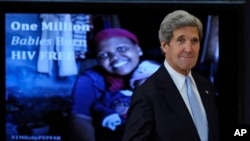STATE DEPARTMENT —
U.S. Secretary of State John Kerry has announced new anti-AIDS funding to mark the 10th anniversary of the primary U.S. program to combat the disease.
Kerry said it is worth remembering how bleak things looked 10 years ago. With nearly 30-million people infected with the virus that causes AIDS, he said an entire generation looked lost.
"When this disease appeared to be unstoppable, history will show that humanity and individual humans rose to the challenge," he said." Action was taken. Innovations were discovered. Hope was kindled. And generations were saved."
Kerry said this "victory for the human spirit" shows what can happen when people overcome ideologies and politics. Signed into law by George W. Bush, the President's Emergency Plan for AIDS Relief, known as PEPFAR, is the world's largest and one of the most successful foreign assistance programs.
New HIV infections are down nearly 20 percent during the past decade. In Sub-Saharan Africa, U.S. officials say the number of new infections and AIDS-related deaths are down by almost one-third.
In Namibia, for example, one-in-four pregnant women were HIV positive in 2002. The country's Minister of Health and Social Services, Dr. Richard Kamwi, said PEPFAR has helped turn that around.
"We have developed and implemented policies, programs, and services that have enabled us to prevent the further spread of HIV, treat those who are infected, and care for those who are affected," he said.
Also at a State Department ceremony marking the PEPFAR anniversary was Tanzanian nurse Tatu Msangi, who eight years ago gave birth to an HIV-negative daughter, Faith.
"When the first HIV test is carried out on a baby and it is negative, it is amazing to see the relief and joy on a mother's face," said Msangi. "I remember that feeling so many years ago, fighting so hard to keep my daughter healthy and free of HIV. Today Faith and I have a bright future ahead of us."
Kerry said this month the one-millionth baby will be born HIV-free because of PEPFAR's support.
"Where we once saw a situation spiraling out of control, today we see a virtuous cycle beginning to form: more people receiving treatment and fewer people passing on the virus," he said. "Fewer infections means it is now easier to actually focus treatment efforts. And with fewer people sick and dying we are seeing healthier, more productive populations."
Kerry announced additional PEPFAR funding for Cambodia, Ghana, Nepal, Senegal, Swaziland, and Zimbabwe to strengthen sustainable programs in partnership with host governments and civil society groups.
Kerry said it is worth remembering how bleak things looked 10 years ago. With nearly 30-million people infected with the virus that causes AIDS, he said an entire generation looked lost.
"When this disease appeared to be unstoppable, history will show that humanity and individual humans rose to the challenge," he said." Action was taken. Innovations were discovered. Hope was kindled. And generations were saved."
Kerry said this "victory for the human spirit" shows what can happen when people overcome ideologies and politics. Signed into law by George W. Bush, the President's Emergency Plan for AIDS Relief, known as PEPFAR, is the world's largest and one of the most successful foreign assistance programs.
New HIV infections are down nearly 20 percent during the past decade. In Sub-Saharan Africa, U.S. officials say the number of new infections and AIDS-related deaths are down by almost one-third.
In Namibia, for example, one-in-four pregnant women were HIV positive in 2002. The country's Minister of Health and Social Services, Dr. Richard Kamwi, said PEPFAR has helped turn that around.
"We have developed and implemented policies, programs, and services that have enabled us to prevent the further spread of HIV, treat those who are infected, and care for those who are affected," he said.
Also at a State Department ceremony marking the PEPFAR anniversary was Tanzanian nurse Tatu Msangi, who eight years ago gave birth to an HIV-negative daughter, Faith.
"When the first HIV test is carried out on a baby and it is negative, it is amazing to see the relief and joy on a mother's face," said Msangi. "I remember that feeling so many years ago, fighting so hard to keep my daughter healthy and free of HIV. Today Faith and I have a bright future ahead of us."
Kerry said this month the one-millionth baby will be born HIV-free because of PEPFAR's support.
"Where we once saw a situation spiraling out of control, today we see a virtuous cycle beginning to form: more people receiving treatment and fewer people passing on the virus," he said. "Fewer infections means it is now easier to actually focus treatment efforts. And with fewer people sick and dying we are seeing healthier, more productive populations."
Kerry announced additional PEPFAR funding for Cambodia, Ghana, Nepal, Senegal, Swaziland, and Zimbabwe to strengthen sustainable programs in partnership with host governments and civil society groups.




